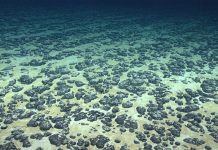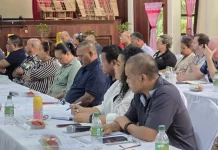The Kingdom of Tonga has used the platform provided by the biggest global environment conference to highlight that the problems caused by the climate crisis for Pacific countries extends far beyond the most commonly felt impact of extreme and more frequent cyclones, storm surge and sea level rise.
Speaking during the High Level Plenary of the 27th United Nations Framework Convention on Climate Change Conference of the Parties (UNFCCC COP) at Sharma El-Sheikh Egypt on Monday, the King of Tonga, Tupou VI relived the devastation his people experienced during the eruption of the Hunga-Tonga-Hunga-Ha’apai volcano, and the tsunami that followed, on 15 January 2022 which compounded even more the existing impacts caused by climate change.
King Tupou VI, who joined world leaders to speak on the first day of the High Level event designed to push for more ambition to address climate change, said the volcanic explosion was like nothing Tonga had ever experienced in its history.
“Homes were destroyed; lives were lost and entire communities are deeply traumatised by the sonic explosions and resulting tsunami waves. Population displacement has now become permanent feature for my people.”
Amidst the chaos and suffering however, there was a ray of hope.
“In the aftermath of the explosion, we experienced the care, compassion and support of the global community, and our neighboring countries in the response and recovery efforts. President, I would like to take this opportunity to thank each and every one of you who have made a contribution to the recovery efforts of my people. I acknowledge your kindness and the compassion shown towards the people of the Kingdom of Tonga.”
But Tonga’s troubles are far from over and King Tupou VI urged world leaders to do everything in their power with a renewed sense of urgency to ensure the survival of the planet, and to avoid a repeat of the events in January.
Since the volcano and tsunami, the King of Tonga highlighted two future challenges to have surfaced. The first is access to safe drinking water.
“The pollution of rainwater water in the aftermath of the Volcanic explosion highlighted the vulnerability of the water storage sites in the outer islands. This urgent reality places greater importance on the access to available water desalination technologies that can operate on renewable energy,” he said.
The second challenge as an Ocean State is to offer affordable transportation that does not add to the Kingdom’s Green House Gas Emissions.
“Our culture and history as people of the ocean has taught us to live in harmony with our environment. In the near future, we will need to re-acquaint our people with such livelihoods and use cutting edge technologies that promote wind- powered, low carbon emitting modes of transport.”
In Egypt this week, the King of Tonga added his voice to that of other world leaders who have called for new financing mechanisms for climate change, as well as the need for the biggest emitters to be more responsible for their actions.
“We acknowledge and commend the outcomes from COP26 and note that we will only be a step closer to our goals if every country delivers on their pledge. We are here to make progress from where we stood with the Glasgow Climate Pact and more importantly, with the commitments we made at the adoption of the Paris Agreement. Our task in delivering for Our People and for Our Planet is to agree to goals with the highest ambition possible and act together and before the impacts become irreversible for us all.”
King Tupou VI called for more international financial assistance to mitigate and help Tongans adapt to the reality of the environment today. He added that while Tongans have historically been very resilient in the face of climate impacts, the frequency of more alarming and extreme weather events, coupled with coastal erosion, ocean acidification and the loss of coral reefs, continues to make life even harder for the population.
“As Small Island Developing States, we cannot face the challenges presented to all of us alone. We are firmly committed to international goals,” he said.
“For Small Island Developing States like Tonga, adaptation to climate change generates larger benefits when delivered in conjunction with other development activities such as disaster risk reduction and community-based approaches to development.
“My Kingdom shares the concerns of the other countries of the Pacific Islands Forum. In solidarity, we endorsed the 2050 Strategy for the Blue Pacific Continent that highlights the challenges that we face as a region and symbolises our drive to respond to our ever-changing environment.”
The eruption of the Hunga-Tonga-Hunga-Ha’apai volcano on 15 January 2022 was the largest recorded since the eruption of Krakatoa in 1883. The eruption triggered tsunami waves of up to 15m which struck the west coast of Tongatapu, ‘Eua and Ha’apai. Ashfall covered an area of at least five square kilometres.
The 2050 Strategy for the Blue Pacific Continent sets out the region’s approach to collectively work to achieve the long-term vision and aspirations of the Strategy, through seven key thematic areas.
It highlights concerns for the region’s enduring challenges such as climate change related impacts, coupled with the intensification of geostrategic competition, exacerbating the region’s existing vulnerabilities.
“As the impacts of climate change are inter-generational and our actions and decisions today will have a major bearing on the future of our people. I am encouraged by the agenda at COP27 over the coming days,” King Tupou VI said.
“I hope that all of us here present will be inspired, motivated and driven into action on firm commitments, a sense of shared responsibility and connection with the global community. This will be a testament to genuine partnerships of all Parties, in raising ambitions and actions towards achieving the goals of the Paris Agreement,” said King Tupou VI.
SOURCE: SPREP/PACNEWS













